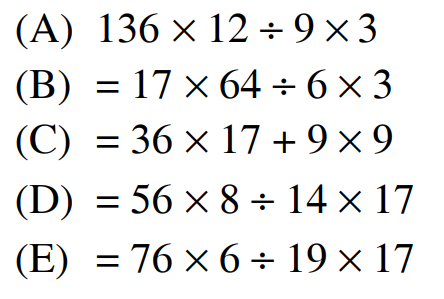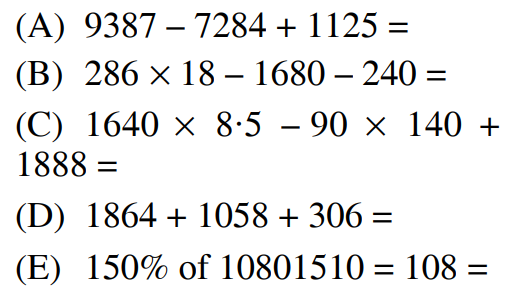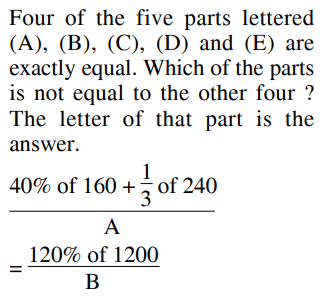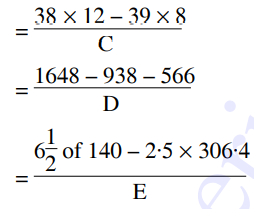In each of the following question and equation is presented in four parts with = sign in between parts. The four parts of the equation are lettered (A) (B) ( C) and (D). One of these parts in the equation may be wrong and there by may not yield the same result as the other three parts do. Find out the wrong part. If there is any. If all the four parts are correctly equated and all of them yield the same result, the answer is (E) i.e.,’No,error’.
10% of 0⋅12
12% of 0⋅1
1% of (12×0⋅1)
100% of (120×0⋅00001)
The correct Answer is:D
To solve the problem, we need to evaluate each of the four parts of the equation to determine if they yield the same result or if one of them is incorrect. The four parts are:
(A) 10% of 0.1
(B) 12% of 0.1
(C) 1% of 12 × 0.1
(D) 100% of 120 × 0.0001
Let's calculate each part step by step.
Step 1: Calculate Part (A)
Part (A): 10% of 0.1
To calculate this, we convert the percentage to a decimal and multiply:
10%=10100=0.1
Now, multiply by 0.1:
0.1×0.1=0.01
Step 2: Calculate Part (B)
Part (B): 12% of 0.1
Convert the percentage to a decimal and multiply:
12%=12100=0.12
Now, multiply by 0.1:
0.12×0.1=0.012
Step 3: Calculate Part (C)
Part (C): 1% of 12 × 0.1
First, calculate 1% of 12:
1%=1100=0.01
Now, multiply by 12:
0.01×12=0.12
Then, multiply by 0.1:
0.12×0.1=0.012
Step 4: Calculate Part (D)
Part (D): 100% of 120 × 0.0001
Convert the percentage to a decimal and multiply:
100%=1
Now, multiply by 120:
1×120=120
Then, multiply by 0.0001:
120×0.0001=0.012
Summary of Results
- (A) = 0.01
- (B) = 0.012
- (C) = 0.012
- (D) = 0.012
Conclusion
From the calculations:
- Part (A) yields 0.01
- Parts (B), (C), and (D) yield 0.012
Thus, the wrong part is (A).
(B) 12% of 0.1
(C) 1% of 12 × 0.1
(D) 100% of 120 × 0.0001
Part (A): 10% of 0.1
To calculate this, we convert the percentage to a decimal and multiply:
10%=10100=0.1
Now, multiply by 0.1:
0.1×0.1=0.01
Part (B): 12% of 0.1
Convert the percentage to a decimal and multiply:
12%=12100=0.12
Now, multiply by 0.1:
0.12×0.1=0.012
Part (C): 1% of 12 × 0.1
First, calculate 1% of 12:
1%=1100=0.01
Now, multiply by 12:
0.01×12=0.12
Then, multiply by 0.1:
0.12×0.1=0.012
Part (D): 100% of 120 × 0.0001
Convert the percentage to a decimal and multiply:
100%=1
Now, multiply by 120:
1×120=120
Then, multiply by 0.0001:
120×0.0001=0.012
- (A) = 0.01
- (B) = 0.012
- (C) = 0.012
- (D) = 0.012
From the calculations:
- Part (A) yields 0.01
- Parts (B), (C), and (D) yield 0.012
Topper's Solved these Questions
Similar Questions
Four parts out of the five parts lettered (A) (B) (C ) (D) and (E) in the following equation are exactly equal. Which one of the given part is not equal to the other four parts? The letter of that parts is the your answer?

View SolutionFour of the five parts lettered (A),(B),(C ),(D) and (E ) in the following equations are exactly equal.Which of the part is not equal to the other four ? The letter of that part is the answer --

View Solution
Knowledge Check
Three of the four parts are exactly equal which of the parts is not equal to other three?
A(62+22)÷22−17B116×2+27−266C(62×9)÷2√49Dnone of theseThree of the four parts are exactly equal. Which of the parts is not equal to other three ?
A20% of 40% of 50B60% of 50C1003% of 90Dnone of theseThree of the four parts lettered (A) (B) ( C) and (D) are exactly equal. You have to find that part which is not equal to the other three. If all the four parts are equal, that the answer is (E).
A38%of 25+50B8×19−57C64×12−673D20×7−15×3.


View SolutionThree of the four parts lettered (A) (B) ( C) and (D) are exactly equal. You have to find that part which is not equal to the other three. If all the four parts are equal, that the answer is (E).
View SolutionThree of the four parts lettered (A) (B) ( C) and (D) are exactly equal. You have to find that part which is not equal to the other three. If all the four parts are equal, that the answer is (E).
View SolutionThree of the four parts lettered (A) (B) ( C) and (D) are exactly equal. You have to find that part which is not equal to the other three. If all the four parts are equal, that the answer is (E).
View SolutionThree of the four parts lettered (A) (B) ( C) and (D) are exactly equal. You have to find that part which is not equal to the other three. If all the four parts are equal, that the answer is (E).
View Solution
